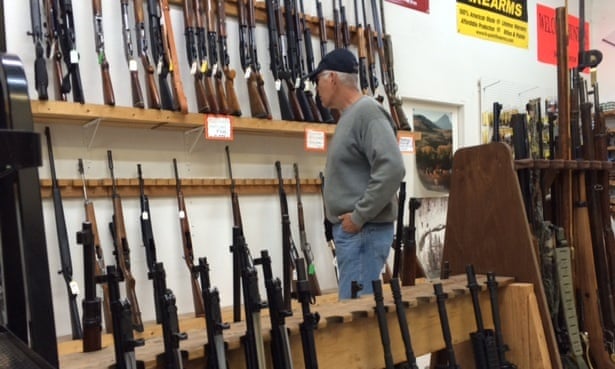Dan Hodges, Tweet on 19 June 2015
Conservatism is a powerful and important force in politics. While
radicals are sometimes able to get hold of the controls, they struggle to
remain there for long; the energy and dynamism of a reform movement can collapse
in the face of political challenges, and when this occurs, the conservative
stands waiting. In European politics, David Cameron
and Angela Merkel showed that conservatism doesn't necessarily result in steadfast resistance to change: both leaders moved their parties towards a greater acceptance of changing
social attitudes, highlighted by the passing of gay marriage in the UK in 2014 and Merkel’s welcome for
Syrian refugees.
 |
| The Roseburg Gun Shop in Roseburg, Oregon. Photograph: Rory Carroll/The Guardian |
However, conservatism is not always so adaptive. In the United States,
there is outrage again amongst liberals following another school shooting
incident in Roseburg, Oregon last month in which 10 people were killed. Making
his fifteenth statement on shootings in the U.S. since taking office, President
Obama remarked: ‘somehow this has become routine’. Since Obama won
re-election in November 2012, almost a thousand mass shooting incidents have
taken place in America, including nearly three hundred so far this year. The
lack of any gun control reforms in the same period gives weight to Dan Hodges’
view that, in practical terms, the debate is over.
Indeed, judging by the posts in response to Hodges’ tweet, it would
seem that the two sides are now talking an entirely different language. Whilst gun control advocates cite statistics showing the disproportionate and shocking
levels of gun violence in the United States, the defenders of the status
quo put forward arguments that shift attention on to different ground: abortion,
knife crime in Britain, terrorism and the need for better mental health care. These
are red herrings, and I suspect their proponents know (perhaps very
deep down) that the disproportionate levels of gun crime in the United States
are, from a rational point of view, hard to justify.
However, guns are above all emotive symbols in the identity of
American conservatives. While this may sound trivial, it is not meant to. Joan Burbick,
a professor at Washington State University, has referred to the nation's
"hard-wired belief in guns." Did she mean to get theological? If so,
I think she was on to something. Conservatives are comfortable arguing for the
unseen benefits of long-held traditions and customs. In the aftermath of Sandy
Hook, Alex Massie wrote
eloquently about the role of guns in the making of America and in modern
American identity. For defenders, the primary reference point is still the
Second Amendment to the US constitution, drafted at a time of organised
military resistance to the British Empire but revered as a timeless, and
flawless, prescription for individual liberty. Putting aside the arguments
about lobbying and corruption, conservatives have a lot of emotional and
reputational investment in this debate: the experience of defending gun rights
against repeated attacks in the aftermath of horrific shootings has bound the group
together: to step back now, to retreat, would be to betray colleagues and
friends as well as deeply-held principles. And with every bloody incident, and
every public defence, the cost of backing down gets higher and higher.
I recently had a conversation with the father of a pupil at Brighton
College, who grew up in South Africa during Apartheid. Many of those who
supported the regime were good men and women, he explained, courteous to their
friends, believers in social justice and not inherently opposed to reform. But
over the years, as the external criticism mounted and South Africa became a
pariah state in the eyes of the world, many whites began to identify more
strongly with the harsher aspects of the Apartheid system. Having followed it
so far down the road, pulling back would be to admit that they had always been
mistaken, and that their critics truly had the moral high ground. There is a
challenge here for liberals and conservatives alike: the gun control argument
will not be won by convincing opponents of their moral inferiority. A new
language must be found, one that takes the concepts of individual
responsibility and self-discipline promoted by gun-owners and gives them some
legislative teeth. As in South Africa, neither side should be happy to continue
the struggle to the bitter end.